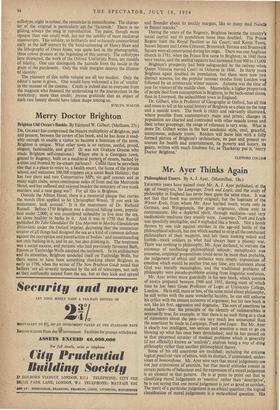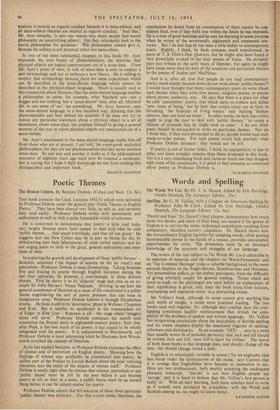Mr. Ayer Thinks Again
Philosophical Essays. By A. J. Ayer. (Macmillan. 18s.)
EIGHTEEN years have passed since Mr. A. J. Ayer published, at tint age of twenty-six, his Language, Truth and Logic, and the study of philosophy in England has never been quite the same since. It was not that that book was entirely original; but the logicians of the Wiener Kreis, from whom Mr. Ayer learned much, wrote only in German, and Wittgenstein, the great originator, chose only to communicate, like a departed spirit, through mediums—and very mediumistic mediums they usually were. Language, Truth and Logic( was spendidly intelligible, and it exploded like a bomb. Not a bomb thrown by one side against another in the age-old battle of the philosophical schools, but one which seemed to strip all the combatant philosophers of their weapons, and left them looking naked and foolish—mock soldiers in what had always been a phoney war. There was nothing in philosophy, Mr. Ayer declared, to warrant the existence of conflicting philosophical schools; metaphysics was nonsense, empirical propositions could never be more than probable, the judgement of ethics and esthetics were simply expressions of emotion which would be neither true nor false, any statement about God was literally meaningless, and the traditional problems of philosophy were pseudo-problems arising from linguistic confusion. Mr. Ayer writes more guardedly in his new book, which consists of essays prepared between 1946 and 1953, during most of which time he has been Grote Professor of Logic at University College, London. He is still, more or less, of the same mind about philosophy, he still writes with the same wonderful lucidity, he can still unhorse his critics with the utmost economy of argument; but his new book is ' not, like his first, aggressive and dogmatic. The sort of assertions he makes here—that the principle of the identity of indiscernibles is necessarily true, for example, or that there is no such thing as a class of statements about the past—are very much less sensational than the assertions he made in Language, Truth and Logic. But Mr. Ayer is clearly too intelligent, too serious and sensitive a man to go on blowing up what has once been demolished; and he has passed on to that piecemeal scrutiny of residual problems which is generally (if not officially) known as 'analysis'; analysis being a way of doing philosophy rather than another philosophical theory.
Some of his old assertions are modified; including the extreme logical positivist view of ethics, with its distinct, if unintended, under- tones of immoralisme. Mr. Ayer now says that moral judgements are not just expressions of emotion, but that moral attitudes consist in
certain patterns of behaviour and the expression of a moral judgement is an element in that pattern. He is at pains to point out that in
classifying moral judgements as `emotive' rather than `descriptive', he is not saying that one moral judgement is just as good as another. The merit of a particular judgement is an ethical question; the logical classification of moral judgements is a meta-ethical question. His analysis is neutral as regards conduct because it is meta-ethical, and all meta-ethical theories are neutral as regards conduct. And that,' Mr. Ayer remarks, 'is also one reason why many people find moral philosophy an unsatisfying subject. For they mistakenly look to the moral philosopher for guidance.' The philosopher cannot give it, because his subject, is not practical ethics but meta-ethics.
In two of the most substantial chapters in this book Mr. Ayer expounds his own brand . of phenomenalism, the doctrine that physical objects are logical constructions out of a sense-data. From Mr. Ayer's point of view, to talk of sense-data is only to employ a new terminology and not to embrace a new theory. He is willing to employ that terminology because thereare some experiences which can be described in the sense-datum language which cannot be described in the physical-object language. Much is usually said in this connection about illusions; that the sense-datum language enables a philosopher to name, for example, what Macbeth saw—not a dagger and not nothing, but a 'sense-datum' (and, after all, Macbeth did, in one sense of 'see', see something). Mr. Ayer, however, uses the sense-datum language in a less localised way, thinking that the phenomenalist can best defend his position if he does not try to reduce any particular statement about a physical object to a set of statements about sense-data, but confines himself to giving a ,general account of the way in which physical objects arc constructed out of a sense-datum.
Mr. Ayer's attachment to the sense-datum language marks him off from those who are at present, I am told, the avant-garde analytical philosophers; for they are not phenomenalists and they never mention sense-data. So one way and another it looks as if the philosophical extremist of eighteen years ago must now be counted a moderate; but in saying this I hope I shall discourage no one from reading this distinguished and important book. '
MAURICE CRANSTON



































 Previous page
Previous page